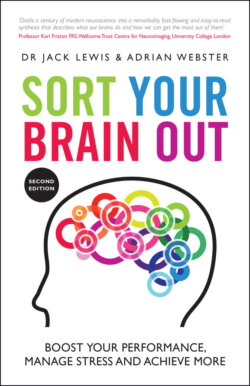Читать книгу Sort Your Brain Out - Джек Льюис, Адриан Вебстер - Страница 23
Cyber Heads Brain for sale – no longer needed
ОглавлениеIs technology good or bad for our brains? With around 4.5 billion active internet users, 41 million text‐based messages sent every minute and many people now spending more time gaming online than they do sleeping, are we all becoming mindless zombies, unable to interact with each other on a face‐to‐face basis? Or are people getting all worked up about nothing, worrying unnecessarily about the potential consequences of digital immersion that, in reality, pose no major threat to the future of the human race?
The more Facebook friends a person has, the greater the grey matter density in brain areas involved in social interaction.
The truth is it all depends on what type of technology you're talking about. It also depends on how intensively the technology in question is being used. And it depends on the specific person using the technology. As with most things the rule of thumb is this: Everything in moderation.
The main threat of many technologies is that many games and applications are often specifically designed to encourage overuse. The twin problems associated with using a certain technology for many hours every day are: 1) you will probably be diverting time away from other activities that would yield greater benefit for your productivity and well‐being and 2) you could well be triggering neuroplasticity that leaves your brain worse at meeting many of the challenges of everyday life rather than better.
Internet search engines make a whole world of information instantly available to us, literally putting the information at our fingertips. So why would anyone want to bother committing anything to memory when it can be pulled up on a screen within seconds? Recent studies have shown that this might not be a great idea.
When people know they can just search for the information again in the future, they retain what they've learned only for very short periods of time. It turns out that they're pretty good at knowing where to look to find this information again in the future. But until they do that, the information tends not to be available in their memory, posing a problem when it comes to getting wiser. No wonder conversations are forever being put on pause while people fiddle with their smartphones – to find those facts that they know, but can't quite remember.
Access: In 1984, there were one thousand devices hooked up to the internet across the globe. Eight years later, in 1992, this number hit the one million mark. The one billion mark was crossed in 2008. These days it makes more sense to count how many people in the world don't have some kind of access to the internet (fewer than 2 billion in 2020).
Quantity: By 2020 the digital world had been estimated to comprise 44 zettabytes (forty‐four thousand, billion, billion bytes). That's more bytes of data on the internet than there are stars in the universe.
Labour‐saving devices have unquestionably changed our lives beyond all recognition, but will the continuing tsunami of innovations leave us all with redundant brains, unable to do much without technological assistance? As yet, there are no conclusive answers to such questions. But you can rest assured that your brain will have been doing what brains do so brilliantly well – changing and adapting to meet the demands of the new digital environment it now spends the majority of the waking day immersed in. No matter how old your brain happens to be, it will already have been busy reconfiguring and shaping up to embrace whatever new challenges this ever‐expanding techno era happens to throw at it.
